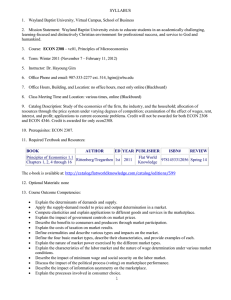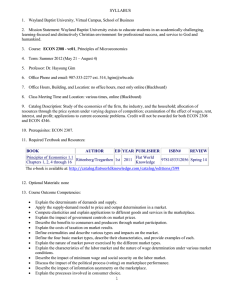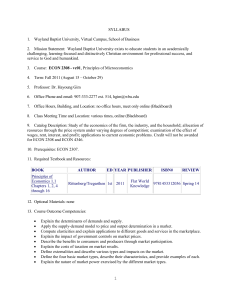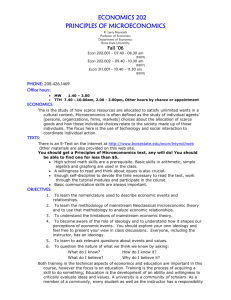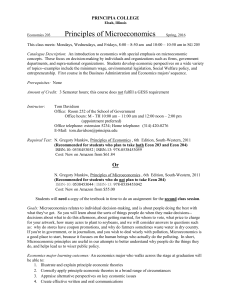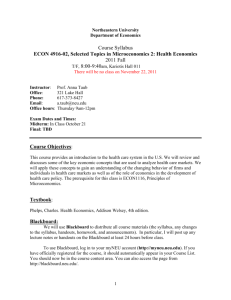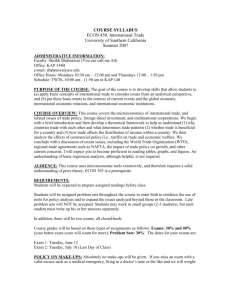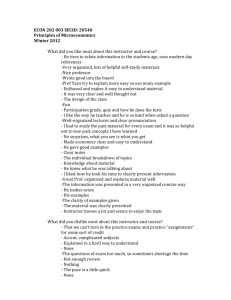Principles of Macroeconomics
advertisement
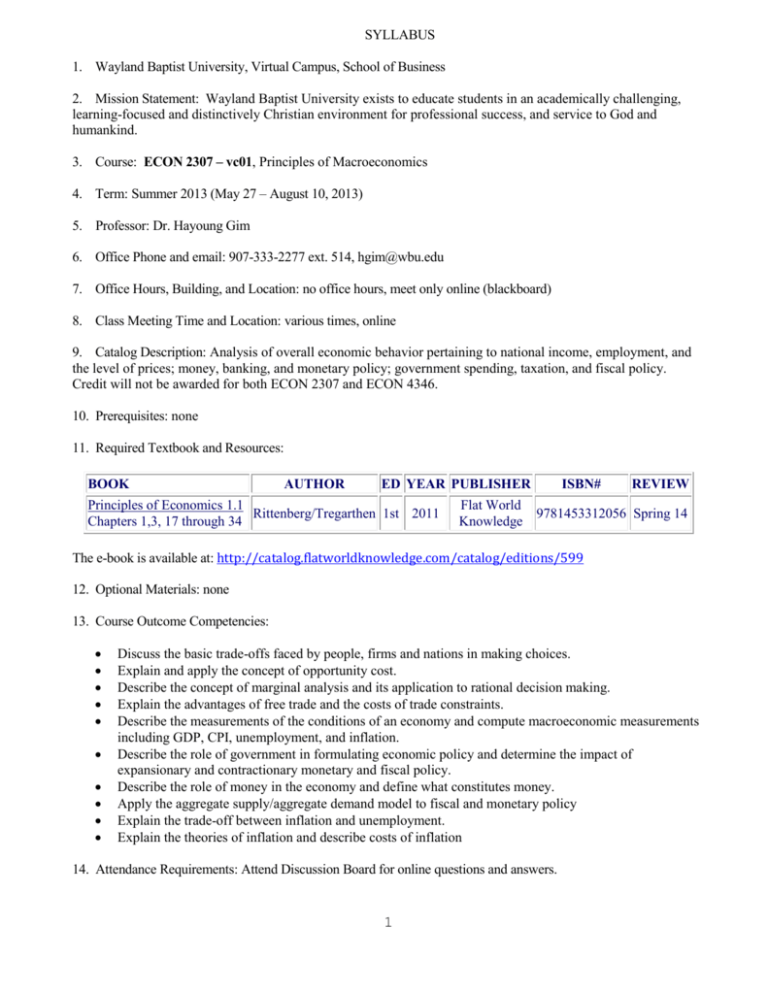
SYLLABUS 1. Wayland Baptist University, Virtual Campus, School of Business 2. Mission Statement: Wayland Baptist University exists to educate students in an academically challenging, learning-focused and distinctively Christian environment for professional success, and service to God and humankind. 3. Course: ECON 2307 – vc01, Principles of Macroeconomics 4. Term: Summer 2013 (May 27 – August 10, 2013) 5. Professor: Dr. Hayoung Gim 6. Office Phone and email: 907-333-2277 ext. 514, hgim@wbu.edu 7. Office Hours, Building, and Location: no office hours, meet only online (blackboard) 8. Class Meeting Time and Location: various times, online 9. Catalog Description: Analysis of overall economic behavior pertaining to national income, employment, and the level of prices; money, banking, and monetary policy; government spending, taxation, and fiscal policy. Credit will not be awarded for both ECON 2307 and ECON 4346. 10. Prerequisites: none 11. Required Textbook and Resources: BOOK AUTHOR ED YEAR PUBLISHER Principles of Economics 1.1 Rittenberg/Tregarthen 1st 2011 Chapters 1,3, 17 through 34 ISBN# REVIEW Flat World 9781453312056 Spring 14 Knowledge The e-book is available at: http://catalog.flatworldknowledge.com/catalog/editions/599 12. Optional Materials: none 13. Course Outcome Competencies: Discuss the basic trade-offs faced by people, firms and nations in making choices. Explain and apply the concept of opportunity cost. Describe the concept of marginal analysis and its application to rational decision making. Explain the advantages of free trade and the costs of trade constraints. Describe the measurements of the conditions of an economy and compute macroeconomic measurements including GDP, CPI, unemployment, and inflation. Describe the role of government in formulating economic policy and determine the impact of expansionary and contractionary monetary and fiscal policy. Describe the role of money in the economy and define what constitutes money. Apply the aggregate supply/aggregate demand model to fiscal and monetary policy Explain the trade-off between inflation and unemployment. Explain the theories of inflation and describe costs of inflation 14. Attendance Requirements: Attend Discussion Board for online questions and answers. 1 15. Disability Statement: “In compliance with the Americans with Disabilities Act of 1990 (ADA), It is the policy of Wayland Baptist University that no otherwise qualified person with a disability be excluded from participation in, be denied the benefits of, or be subject to discrimination under any educational program or activity in the university. The Coordinator of Counseling Services serves as the coordinator of students with a disability and should be contacted concerning accommodation requests at (806) 291 – 3765. Documentation of a disability must accompany any request for accommodations.” 16: Course Requirements: Students are required to read lectures/videos and the text book, attend the discussion forums regularly, and take a midterm exam and a final exam. Lecture, Discussions, & Exams: Lectures, and questions or discussion topics will be posted on the Blackboard each week (by Monday Night). After reading lecture notes (and/or seeing lectures), students go to Discussion Board, and answer the posted questions (=home work) and ask own questions (as if you are in a class room). Every student should answer the posted question(s) and ask at least one question from lectures, textbook readings, or any economics topics that are related with the lecture topics each week by Sunday Night. The instructor and students will discuss topics, ask questions, and answer the questions in the Blackboard discussion forums. Students will take exams either within the Blackboard facilities, or take-home basis. The instructor will announce details about the exam prior to each exam. Students will turn in their exams through the exam page of the Black board. Discussion Forums: Students are required to attend the discussions that are on discussion board each week and responsible to the contents discussed on the board. The instructor will start a forum with a topic or a question that are related with the lecture, and students will answer the question, and ask questions. The instructor expects active questions and answers using economics terminologies over current real world economic issues and economics theories in an organized manner. Students’ questions and answers in the forum will be counted. A student who never appear on the forum for the first two weeks will be reported to the university, and the university will drop the student from the course. Every week’s forum counts 2.5% of the semester grade (2.5% *8 = 20%). Exams: Exams will have multiple choice and short essay type questions. Students will complete the exam within a certain length of time. The instructor will announce the details prior to the exam. Weighing Scheme: Discussion Forums: Midterm Exam: Final Exam: TOTAL Grading Scale (%): 90 – 100 80 – 89 70 – 79 60 – 69 59 and below 50 points (20 % for the term) 100 points (40 % for the term) 100 points (40 % for the term) 250 points A B C D F 2 17. Tentative Schedule: Date Week 1 5/27-6/2 Week 2 6/3-6/9 Assignment Chapter Economics: The study of choice 1, 3 Demand and Supply International Trade 17, 18, The Economics of Environment 19 Inequality, Poverty, and discrimination Week 3 6/10-6/16 Week 4 Macroeconomics: big picture 20, 21 Measuring total output and income Aggregate Demand and Aggregate Supply 6/17-6/23 Economic Growth Week 5 Midterm Exam 22, 23 6/24 – 6/30 Week 6 7/1-7/7 Week 7 7/8-7/14 Week 8 7/15-7/21 Week 9 7/22-7/28 Week 10 The Nature and Creation of Money 24, 25 Financial Markets and the Economy Monetary Policy and the Fed 26, 27 Government and Fiscal Policy Consumption and the Aggregate Expenditure Model Investment and Economic Activity Net Exports and International Finance 28, 29, 30 Inflation and Unemployment A Brief History of Macroeconomic Thought and Policy Economic development Socialist Economies in Transition 31, 32, 33, and 34 FINAL EXAM: will be on materials covered after the midterm exam 7/29-8/4 18. No student should ask to take exams earlier than scheduled. 3
